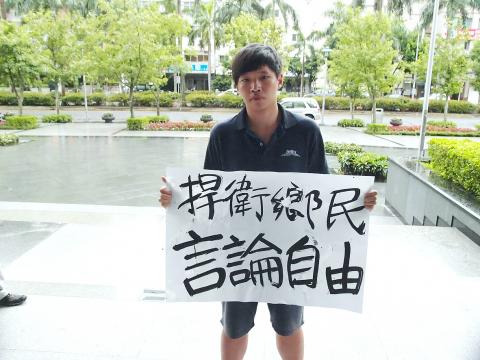Despite repeated threats that he would file a lawsuit against National Tsing Hua University student Chen Wei-ting (陳為廷) over an image posted on Facebook, China Times Weekly deputy editor-in-chief Lin Chao-hsin (林朝鑫) had yet to act on his threat yesterday, while Chen said he was ready to defend freedom of speech on the Internet.
“Instead of finding out the truth about the ‘walking fee incident,’ Want Want China Times Media Group chose to [threaten to] file a lawsuit against a college student for posting an image on Facebook,” Chen told a news conference in Taipei yesterday morning. “The lawsuit is not only against me, it’s against all netizens, and Taiwanese civil society.”
Chen was referring to a lawsuit that Lin has repeatedly vowed to bring against him for posting a snapshot of a CTiTV news report of a student protest against the merger of Want Want and cable TV service provider China Network Systems (CNS) on Wednesday.

Photo: Chen Ping-hung, Taipei Times
On Friday, Want Want Group’s media outlets — the Chinese--language China Times, China Times Weekly and CTiTV — all reported that the student crowd was paid to stage the protest, and implied, without providing evidence, that Academia Sinica research fellow Huang Kuo-chang (黃國昌), who organized a separate protest earlier, was behind the incident.
Netizens took a snapshot from the CTiTV report on the protest that showed Lin among the crowd and questioned whether the media group was actually the one behind it.
Although Chen was only one of the hundreds of netizens who posted the image online, Lin seems to believe that Chen was the person who originally produced the image, since he was quoted by the China Times yesterday as saying that Chen was the person who took the photograph.
“Most of the people opposed to the merger of Want Want and CNS feel that way because they worry that a media giant ... threatens the freedoms of the press and of speech,” Chen said. “What Lin and the media group have been doing these past few days just proves that our worries are not baseless.”
“As a mere student, I feel helpless, but I’m determined to fight on, not only for myself, but also for freedom of speech on the Internet,” Chen said.
Lin said in a telephone interview that he would sue Chen to defend his reputation. Although he originally said he would file the lawsuit against Chen because he believed Chen was the one who took the snapshot, Lin later said that Chen was not his ultimate target.
“The purpose of the lawsuit is not to do something against a student, rather, it is to find out who’s behind the entire incident,” he said.
Lin told media that he would file the lawsuit at 2pm. As of press time, he had yet to file anything.

Authorities have detained three former Taiwan Semiconductor Manufacturing Co (TMSC, 台積電) employees on suspicion of compromising classified technology used in making 2-nanometer chips, the Taiwan High Prosecutors’ Office said yesterday. Prosecutors are holding a former TSMC engineer surnamed Chen (陳) and two recently sacked TSMC engineers, including one person surnamed Wu (吳) in detention with restricted communication, following an investigation launched on July 25, a statement said. The announcement came a day after Nikkei Asia reported on the technology theft in an exclusive story, saying TSMC had fired two workers for contravening data rules on advanced chipmaking technology. Two-nanometer wafers are the most

Tsunami waves were possible in three areas of Kamchatka in Russia’s Far East, the Russian Ministry for Emergency Services said yesterday after a magnitude 7.0 earthquake hit the nearby Kuril Islands. “The expected wave heights are low, but you must still move away from the shore,” the ministry said on the Telegram messaging app, after the latest seismic activity in the area. However, the Pacific Tsunami Warning System in Hawaii said there was no tsunami warning after the quake. The Russian tsunami alert was later canceled. Overnight, the Krasheninnikov volcano in Kamchatka erupted for the first time in 600 years, Russia’s RIA

CHINA’s BULLYING: The former British prime minister said that he believes ‘Taiwan can and will’ protect its freedom and democracy, as its people are lovers of liberty Former British prime minister Boris Johnson yesterday said Western nations should have the courage to stand with and deepen their economic partnerships with Taiwan in the face of China’s intensified pressure. He made the remarks at the ninth Ketagalan Forum: 2025 Indo-Pacific Security Dialogue hosted by the Ministry of Foreign Affairs and the Prospect Foundation in Taipei. Johnson, who is visiting Taiwan for the first time, said he had seen Taiwan’s coastline on a screen on his indoor bicycle, but wanted to learn more about the nation, including its artificial intelligence (AI) development, the key technology of the 21st century. Calling himself an

South Korea yesterday said that it was removing loudspeakers used to blare K-pop and news reports to North Korea, as the new administration in Seoul tries to ease tensions with its bellicose neighbor. The nations, still technically at war, had already halted propaganda broadcasts along the demilitarized zone, Seoul’s military said in June after the election of South Korean President Lee Jae-myung. It said in June that Pyongyang stopped transmitting bizarre, unsettling noises along the border that had become a major nuisance for South Korean residents, a day after South Korea’s loudspeakers fell silent. “Starting today, the military has begun removing the loudspeakers,”